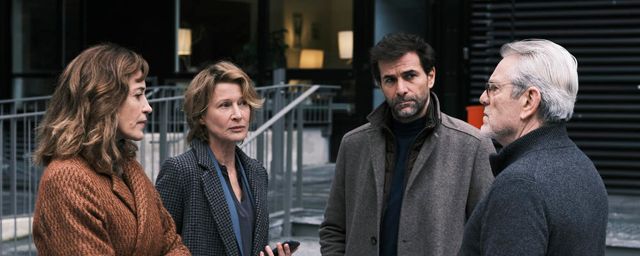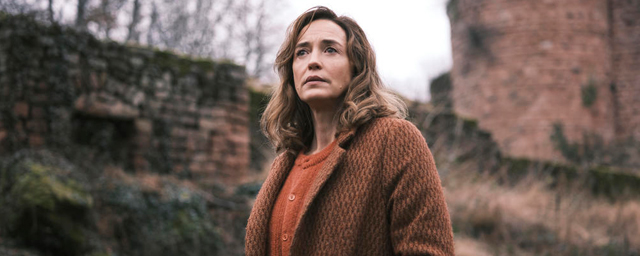After “Balthazar” and “And the mountain will flower”, Hélène de Fougerolles plays the leading role in the series “The Disappeared of the Black Forest”, which starts this evening on TF1. She tells us everything about this dark thriller against a background of violence against women.
Two years after leaving Balthazar, Hélène de Fougerolles is back on TF1 with Les Disparus de la Forêt Noire, a new series in four episodes also starring Grégory Fitoussi, Tchéky Karyo, Thierry Godard, Natalia Dontcheva (Infidèle) and Astrid Whettnall.
Produced in particular by Nagui, this thriller shot between the Starsbourg region and Germany begins when twelve lifeless bodies are found in a mass grave, near the Franco-German border, in the heart of the Black Forest and the binational military base.
All the victims are men, both French and German. And this macabre discovery will come to revive memories that Camille Hartmann, an outstanding examining magistrate who lost her memory following a car accident, believed to be buried. What if this case was linked to the fateful night when the judge’s life changed? What if Camille was involved in this whole story?
Before succeeding Natacha Lindinger in the main role of Sam, Hélène de Fougerolles confides in The Disappeared of the Black Forest and on this darker character than those she has played before. As well as on the basic theme of the series: violence against women.
AlloCiné: You know the detective fictions, you have filmed some of them during your career. We think in particular of Balthazar. I imagine that if Camille Hartmann had been yet another cop, The Disappeared of the Black Forest would not have interested you…
Hélène de Fougerolles: It’s true. Already Camille is a judge, so that didn’t repeat anything compared to what I had been able to do in Balthazar. But what really made me want to go there was to explore something that I had never had the opportunity to do before, with a harsh, tough character, even physically. And who is in a complicated reality and who is struggling to come to the surface. This is what interested me above all.
And then it turns out that the series connects the twists that I did not expect at all, and that I loved. And the production explained to me that it was going to be a fiction with a particular atmosphere, a particular light. An almost genre series, with a very cold side, which was shot in the forest near Strasbourg. It is a very aesthetic thriller.
How did you approach this character of examining magistrate who recovers with difficulty from a heavy trauma and suffers from amnesia?
I had fun imagining how I could be in mid-water, almost snorkeling, trying to come to the surface and having trouble re-emerging. I remember that, sometimes, on the set, I had moments when I had trouble catching my text, “passing the second”. I was really underwater, in this vulnerability. It was important for this role. I had to be in there.
One of the particularities of the series is that it takes place between France and Germany. Did you find out about the differences between the police and the French and German justice system to prepare for your role and the shooting?
No way. As I don’t have any pleading scenes, it didn’t seem essential to me. Camille Hartmann is a somewhat “retired” judge, because she is going through something complicated, trauma and memory loss following a car accident. So I was more interested in how she felt in this vulnerability, where she clings to bits of memories. And finally she finds herself again in the middle of an investigation, and it’s exciting for her, it’s what keeps her going.

Alessandro Clemenza / Banijay Studios France – Fiction’ Air / TF1
Initially, the series begins as a serial killer story. And finally there is a shift and we quickly understand that the real subject of the series is violence against women. This is also what attracted you when reading the screenplay, the fact that the series tackles a subject that is unfortunately still topical, with in particular more than 90,000 women aged 18 to 75 who, over the course of a year, are victims of rape and/or attempted rape?
What I liked is that in the end something was addressed. It wasn’t just an investigation with a search for a murderer. There is a subject which is exposed at the end and which is important. Sometimes we decide to take part in something that we need to denounce. I think it’s good, even if I’m not very feminist in my life, I don’t claim much. I feel fairly equal with the men, I don’t have a problem with that (laughs).
But this series was a way to see feminism from another angle. And to achieve things too, because my character is quite far from all that. And finally she understands that her neighbor is being hit by her spouse and she finds herself confronted with the distress of certain people. Even if, for her, in her own life, it’s not really a subject.
How was the filming with Grégory Fitoussi and Tchéky Karyo, who play the two cops in the story?
I knew them both a little bit. I had filmed with Tchéky when I was 25 years old. We were very happy to meet again. And with Grégory we shot a short film together when we were very young, it was his first film I believe. So we were delighted because we hadn’t had the opportunity to work together again since, even if we had crossed paths once or twice.
Afterwards, we didn’t work much upstream together, because our characters spend a lot of time “sniffing” each other, so we didn’t need to be in symbiosis and know each other perfectly. Whereas with Thierry Godard, we knew each other better, we had already shot together, I had a lot of affection for this actor. And it’s true that right away it was as if we had never left each other. We got together and we could immediately play this couple. There was this promiscuity that was easy and obvious.
You have brown hair in the series. Was it important for the role? Do you like changing heads from one character to another?
Yes, it was to extinguish the character a bit. To take her towards something that is not aesthetic and that is far from the sparkling side that I am often stuck with. I like to change faces from one role to another when given the opportunity.
The series has changed titles twice. It was first called Valkyries, then The Forest of the Vanished, and now The Vanished of Mirkwood. Are you happy with the final choice?
It’s hard to remember (laughs). I really liked Valkyries. I found it beautiful. It fit well with the subject of the series.

Alessandro Clemenza / Banijay Studios France – Fiction’ Air / TF1
You will soon start shooting season 7 of Sam. What excited you about this proposal? You wanted a new recurring role?
I dreamed of a recurring role. In a register that amuses me and in which I have something to express myself. And there, Sam, he’s really a rock, sexy, transgressive character. With very interesting topics such as motherhood, loss of bearings.
TF1 offered me the role, I still thought about it for a while. There was an element of snobbery I think where I said to myself “I prefer to be at the origin of a series”. And then finally I quickly understood that this role, brilliantly defended for years by Natacha Lindinger, was brilliant. So I accepted the challenge. Even if I still passed a casting (laughs). So I won this role and I’m very proud.
This new season will again take place in the countryside, with always Thierry Neuvic et Chantal Ladesou ?
Yes, we stay in the countryside, we keep the same decor. And they are the same characters. It’s just me changing (laughs). I hope it will go well.
Do you have other upcoming projects? Do you have new writing desires after Don’t worry, mom, it’ll be fine ?
I’m currently shooting a romantic Christmas comedy with Lannick Gautry and Florent Peyre, which is called Noël… and more if you like, and which will be broadcast at Christmas 2023 a priori. It’s with the Beaubourg production, with which I had made Balthazar.
But going back to writing, no, I don’t think so. I turned out to be a great gardener so I’m going to take care of my garden (laughs). I also make jewelry, I like to create things with my hands. But otherwise I don’t really feel like doing anything other than my job as an actress for the moment.

